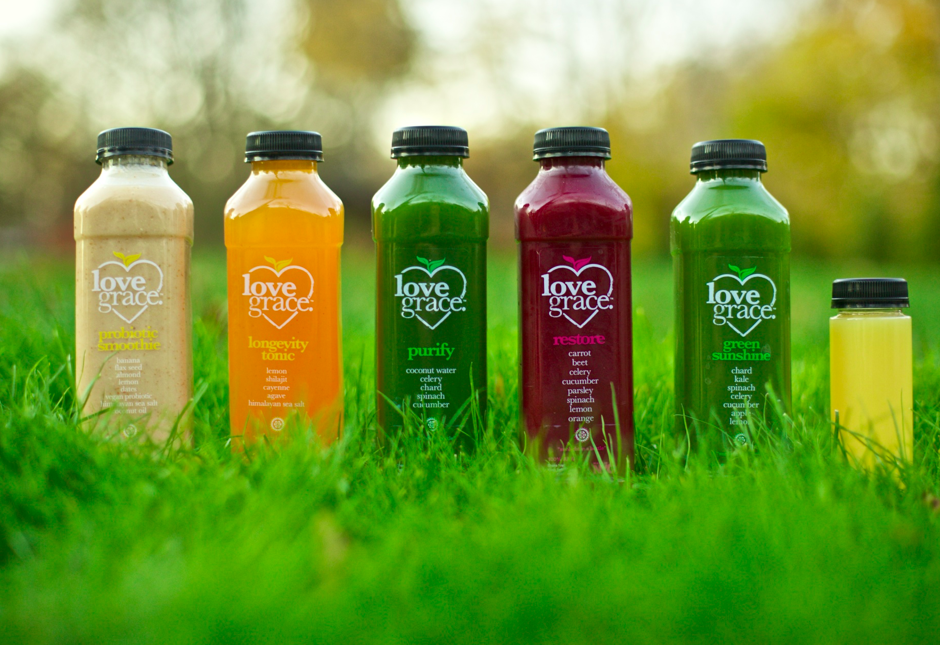
THE GREAT JUICE RUSH OF 2013
Once upon a time long ago, in 1996, Doug Green happened upon a storefront in New York’s East Village. He was young, passionate, spiritual, and committed to his dreams of owning a super-high-quality juice bar. That year he opened Liquiteria and became the original “juice-apreneur,” a combination of health fanatic and spiritual guru slinging all-natural, cold-pressed gold. Green’s Liquiteria was the mothership of the juicing business, the first mover in what has become the most valuable commodity since coffee.
When Liquiteria launched, juicing was something done in the back of health-food stores or on late-night infomercials. But since then, Liquiteria has spawned a phenomenon of copycats and become a magnet for moguls and luminaries, including Starbucks CEO Howard Schultz, Oprah Winfrey, and Natalie Portman. Liquiteria juices are cold pressed, meaning they are prepared on a Norwalk Press that the company says maintains 100 percent of the “cellular and enzymatic integrity, a.k.a. the life force.” Furthering the blueprint for a successful, modern juice brand, Liquiteria names its concoctions using warrior-style identities like “The Killer” and cutesy new-age names like “The Grasshopper.” The brand sells hundreds of bottles of juice daily at $7 and up, an estimated mark-up of 200–300 percent depending on the fruit.
Things were good for Liquiteria, but nothing lasts forever. After years of solitary existence, Liquiteria’s secret formula was discovered. Former employees, partners, and friends started their own juice brands, eroding Green’s first-mover advantage. Frustrated and tired, he recently sold to a group of investors, and his once-promising franchise is now in danger of becoming the fading independent.
The same cannot be said for Denise Mari and Doug Evans of Organic Avenue. They now have 11 locations, including in Midtown Manhattan, Southampton, Chelsea, and Soho. Organic was founded on Mari’s love for whole foods, healing, vegetarianism, and entrepreneurship, and is inspired by something she and Evans call the L.O.V.E (“Live, Organic, Vegan, Experience”) lifestyle. Organic Avenue’s business is booming. For $6, you can order 16 ounces of Cooling Cucumber Juice or a shot of Chlorophyll that promises it will “regenerate and cleanse your body at a molecular and cellular level.” Sounds fabulous, but whether or not my cells or molecules are regenerated, there is no denying that Organic Avenue’s lifestyle and, most importantly, juices are here to stay, and in a very big way. (In fact, while I wrote this article, Organic Avenue announced a majority investment by private equity firm Weld North.)
There are dozens more flourishing and expanding juice brands, like Juice Press and Squeeze Juice, but look no further than Starbucks’s $30 million acquisition of Evolution Fresh for signs that the juice rush is on. Starbucks is so bullish on juice that it is building a high-tech “juicery” that will quadruple production and distribution capacity to take part in what it calls the “$3.4 billion and growing cold-crafted juice category.” But it doesn’t stop there.
This past summer, Morgans Hotel Group, the leading boutique hotel operator (and my employer), took it one step further by opening a rooftop cocktail bar in New York City specializing in natural, market-fresh cocktails. The cocktails created by master mixologist Steve Olson combine Liquiteria cold-pressed juices with premium spirits. The brainchild of entrepreneur Jesse Itzler, formerly of Marquis Jets and Zico Coconut Water, the cocktail bar was inspired by his desire to continue to live a healthy lifestyle even when he was sipping cocktails with friends. The bar is a smashing success for the hotel group, with hundreds of young professionals and dozens of celebrities lining up to drink $18 all-natural cocktails while dancing to Jay-Z and enjoying beautiful views of downtown Manhattan.
But juicing is not just about quenching your thirst or imbibing healthier cocktails. It also plays into the world of homeopathic medicine and weight loss. A couple of years ago, I embarked on my first BluePrint Cleanse, a concept created by nutritional consultant Zoe Sakoutis. She commercialized cleansing by making juices available in levels that would fit each individual’s nutritional awareness and dietary history. BluePrint started out delivering juices to the home, but they are now available in dozens of stores. Demand is so high that BluePrint expanded beyond cleanses into individual juices, just as Organic Avenue, Liquiteria, and others have jumped into the cleansing business.
There is no question that juicing is more than a trend—it is a new category. Like burgers, pizza, and fried chicken before, there will be different brands, models, and approaches. But with private equity swooping in and fueling explosive growth, the real question is: Will these brands be able to stay true to the principles that made them the success they are today? Green’s dream was all about authenticity. His juices said as much about who you were as what you drank. When the great juice rush of 2013 is over, the juice brand that stays truest to its roots will bear the greatest fruit.
CLOSER LOOK: Organic Avenue
LOCATIONS: 11
WHERE: New York City metro area
ESTABLISHED: 2000
SIGNATURE ITEMS: Organic cold-pressed juices, raw-food cleansing programs, snacks, superfoods
CLICK HERE TO CHECK OUT THE ORIGINAL ARTICLE

